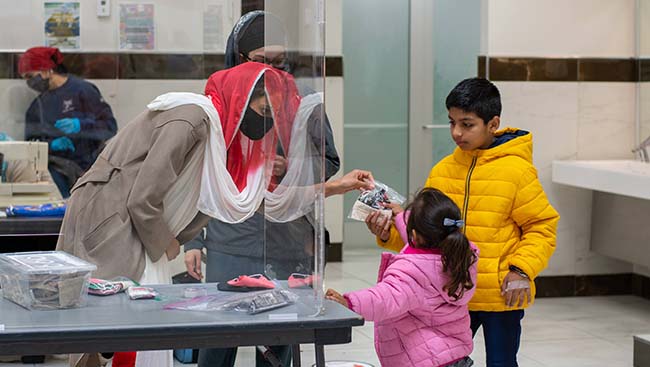The pandemic has brought about a multitude of changes from local and global standpoints. Undeniably, near or far, instrumental to the fight against COVID-19 have been changemakers, volunteers, and organizations that tirelessly devote their time into making sure our loved ones are safe and protected. Such is the story of an organization, the Sikh Health Foundation, that was born during these unprecedented, tough times. This organization is now a community catalyst in the realm of health and public education.
Sukhmeet Singh Sachal, University of British Columbia (UBC) medical student and Founder of the Sikh Health Foundation, traces the beginnings of his idea to a visit he took with his father to the local Gurdwara. He observed that, of everyone present, only he and his father were wearing masks. Sachal details, “I’d see Dr. Bonnie Henry on TV everyday telling everyone to wear masks, so I decided to ask one of the Gurdwara attendees why they weren’t wearing a mask, out of curiosity. They expressed that they were unable to find a mask they could tie around their turban. They also explained that most pandemic-related information disseminated was in English and therefore inaccessible to those with language barriers.”

Sachal realized that these problems are indeed significant and can possibly have a tremendously negative impact if not addressed. With his school shifting to online learning and the inability for Sachal to assist COVID-19 patients physically in hospitals, he decided to help the community in another way. By creating a campaign to keep patrons visiting Gurdwaras safe, he committed to shining light on public health practices and providing related COVID-19 resources in local communities. Sachal then went on to become one of 38 youth worldwide to receive funding from the Clinton Foundation for his efforts in fighting the COVID-19 pandemic, which is how the COVID-19 Sikh Gurdwara Initiative was conceived.
Once funding was secured and the organization had the means to become established, Sachal put out a call for volunteers; many South Asian youth reached out. At a time when many organizations were shutting doors for volunteers, the COVID-19 Sikh Gurdwara Initiative was welcoming volunteers with open arms. As the world was living through history, 150 youth joined the community initiative - all through social media and word of mouth!
A key member to the organization’s success has been the Sikh Health Foundation’s Project Coordinator, Anandita Joshi. “Given that I work with Fraser Health Authority, I took a keen interest in the concept. I saw that not many programs were in place at the time that were targeted towards our communities’ elderly populations. This was a fairly new idea. Since the Gurdwara is a place for the elderly to connect, I was intrigued by the COVID-19 Sikh Gurdwara Initiative.”, shares Joshi.
Sachal notes that South Asians were, at the time, being relatively negatively portrayed in the media as a group that wasn’t necessarily following COVID-19 protocols. However, his organization strived to understand the reason behind why that may be the case and what the gaps were. With the three pillars of seva (selfless service), compassion, and unity, volunteers managed to hand out over 4,000 masks and educated more than 200,000 individuals about COVID-19 using methods, languages, and demos that were most relatable and accessible for their target audiences.
Undoubtedly, the COVID-19 Sikh Gurdwara Initiative’s education-oriented practices broke myths and combatted the problem of fear mongering as well. By showing Gurdwara attendees how to properly wash hands, for example, volunteers were able to bridge the gap of misinformation by making learning easy, accessible, and interactive. “Everyone at Gurdwaras was very thankful because they truly began to understand what we were doing. People were asking us to come back so they could bring in more friends and family. One person told me that he was initially scared to mask up since his friends would make fun of him; he thanked us for educating his friends! Another Gurdwara attendee thanked us for giving him information on testing and symptoms, because of which he was later able to successfully self-isolate in a multigenerational household.”, explains Sachal as he puts into perspective the direct impact the organization has had on many in the community.
The campaign surely broke a lot of boundaries, including changing the narrative that South Asian youth do not spend time with elders; volunteers spent many evenings and weekends stationed at their local Gurdwaras. Additionally, volunteers were able to develop their confidence and gain valuable experiences. It is of no surprise, then, that the model has since spread to Toronto and Calgary in Canada, and as well as California, Kenya, and India, with the organization spreading worldwide.

As the campaign was successfully running and the team began venturing beyond just information dissemination, the COVID-19 Sikh Gurdwara Initiative transformed into the Sikh Health Foundation. Because Gurdwaras are considered to be culturally safe spaces, the Sikh Health Foundation saw an opportunity to provide COVID-19 vaccinations at places of worship. The team broke down exactly what is inside vaccinations through impactful infographics and debunked misinformation. With collaborative efforts in partnership with Fraser Health Authority, the Sikh Health Foundation set up vaccination sites at Gurdwaras, Churches, Mosques, and Mandirs. At the forefront of all these efforts has been carefully constructed, culturally relevant messaging and communication.
Even when the team first launched their campaign in Gurdwaras, the intention was to ensure that the information was not generic. Moving beyond just literal Punjabi translations, the team implemented images and graphics that were simple to understand and relatable, such as symbolizing the six-feet distance rule by showing the length of a turban. Inderpal Dosanjh, Bachelor of Science student at UBC, volunteered at vaccination clinics held at places of worship with the Sikh Health Foundation. He elaborates, “The culturally targeted approach has been highly successful, which is evident through the number of patients that were vaccinated at Gurdwaras. I shared the information provided by the Sikh Health Foundation with my own grandparents, who can’t understand English, allowing them access to reliable and easy-to-understand information. They have found it very useful! Working with the Sikh Health Foundation has allowed me to expand my own knowledge through investigating different aspects of prominent health problems in the community. We are consistently brainstorming novel methods to address these health issues in a culturally relevant way.”
Having worked with the Sikh Health Foundation during the COVID-19 pandemic in an advisory role, Dr. Mary Kestler is a faculty member at the UBC Medical School and her specialty is Infectious Diseases. She describes working with youngsters who care deeply about their communities as an antidote to despair brought on by the pandemic, “I was deeply inspired by the Sikh Health Foundation’s initial work in Gurdwaras and believe that the most effective and authentic work will come from the community itself. In my role as an educator, I have been continuously amazed by the energy and leadership of young people.”
Moving forward, the Sikh Health Foundation plans to continue the work around culturally effective public health messaging. The team is now busy at work starting a new monthly health campaign, where a new public health concept will be highlighted every month to educate communities and raise awareness about different health-related themes. In process is also a documentary-style feature that will shine light on South Asian youth’s actions to help mobilize change in South Asian communities during the pandemic. The hope is that this documentary will be useful for future health crises, through which governments and organizations can see, firsthand, how to help create change. After all, youth energies and perspectives always come without limits; the Sikh Health Foundation believes that they are very valuable to have.

Evidently, by enabling accessible education, the Sikh Health Foundation truly encompasses what it means to be a Sikh, a lifelong learner. With the beauty of people from different religions, cultures, and backgrounds coming together for one cause, the organization is a role-model for all. Starting with a simple observation a young community member made at his local gurdwara, the initiative has now become globally recognized, expanding to a multifaceted organization. As Founder Sachal himself puts it, “The world is so small. Dream big. You CAN make it happen.”






